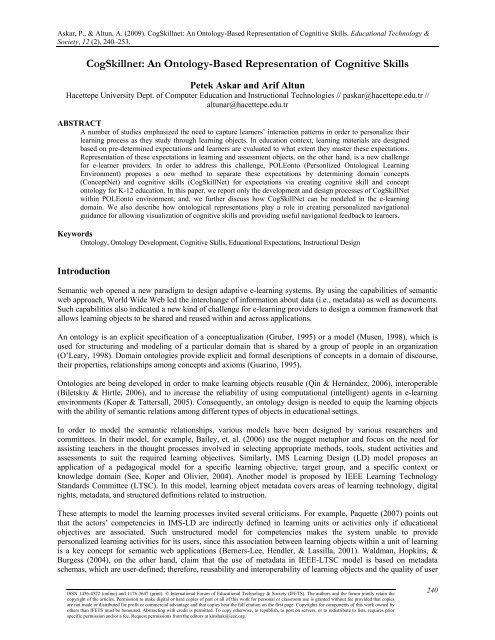Download - Educational Technology & Society
Download - Educational Technology & Society
Download - Educational Technology & Society
You also want an ePaper? Increase the reach of your titles
YUMPU automatically turns print PDFs into web optimized ePapers that Google loves.
Askar, P., & Altun, A. (2009). CogSkillnet: An Ontology-Based Representation of Cognitive Skills. <strong>Educational</strong> <strong>Technology</strong> &<br />
<strong>Society</strong>, 12 (2), 240–253.<br />
CogSkillnet: An Ontology-Based Representation of Cognitive Skills<br />
Petek Askar and Arif Altun<br />
Hacettepe University Dept. of Computer Education and Instructional Technologies // paskar@hacettepe.edu.tr //<br />
altunar@hacettepe.edu.tr<br />
ABSTRACT<br />
A number of studies emphasized the need to capture learners’ interaction patterns in order to personalize their<br />
learning process as they study through learning objects. In education context, learning materials are designed<br />
based on pre-determined expectations and learners are evaluated to what extent they master these expectations.<br />
Representation of these expectations in learning and assessment objects, on the other hand, is a new challenge<br />
for e-learner providers. In order to address this challenge, POLEonto (Personlized Ontological Learning<br />
Environment) proposes a new method to separate these expectations by determining domain concepts<br />
(ConceptNet) and cognitive skills (CogSkillNet) for expectations via creating cognitive skill and concept<br />
ontology for K-12 education. In this paper, we report only the development and design processes of CogSkillNet<br />
within POLEonto environment; and, we further discuss how CogSkillNet can be modeled in the e-learning<br />
domain. We also describe how ontological representations play a role in creating personalized navigational<br />
guidance for allowing visualization of cognitive skills and providing useful navigational feedback to learners.<br />
Keywords<br />
Ontology, Ontology Development, Cognitive Skills, <strong>Educational</strong> Expectations, Instructional Design<br />
Introduction<br />
Semantic web opened a new paradigm to design adaptive e-learning systems. By using the capabilities of semantic<br />
web approach, World Wide Web led the interchange of information about data (i.e., metadata) as well as documents.<br />
Such capabilities also indicated a new kind of challenge for e-learning providers to design a common framework that<br />
allows learning objects to be shared and reused within and across applications.<br />
An ontology is an explicit specification of a conceptualization (Gruber, 1995) or a model (Musen, 1998), which is<br />
used for structuring and modeling of a particular domain that is shared by a group of people in an organization<br />
(O’Leary, 1998). Domain ontologies provide explicit and formal descriptions of concepts in a domain of discourse,<br />
their properties, relationships among concepts and axioms (Guarino, 1995).<br />
Ontologies are being developed in order to make learning objects reusable (Qin & Hernández, 2006), interoperable<br />
(Biletskiy & Hirtle, 2006), and to increase the reliability of using computational (intelligent) agents in e-learning<br />
environments (Koper & Tattersall, 2005). Consequently, an ontology design is needed to equip the learning objects<br />
with the ability of semantic relations among different types of objects in educational settings.<br />
In order to model the semantic relationships, various models have been designed by various researchers and<br />
committees. In their model, for example, Bailey, et. al. (2006) use the nugget metaphor and focus on the need for<br />
assisting teachers in the thought processes involved in selecting appropriate methods, tools, student activities and<br />
assessments to suit the required learning objectives. Similarly, IMS Learning Design (LD) model proposes an<br />
application of a pedagogical model for a specific learning objective, target group, and a specific context or<br />
knowledge domain (See, Koper and Olivier, 2004). Another model is proposed by IEEE Learning <strong>Technology</strong><br />
Standards Committee (LTSC). In this model, learning object metadata covers areas of learning technology, digital<br />
rights, metadata, and structured definitions related to instruction.<br />
These attempts to model the learning processes invited several criticisms. For example, Paquette (2007) points out<br />
that the actors’ competencies in IMS-LD are indirectly defined in learning units or activities only if educational<br />
objectives are associated. Such unstructured model for competencies makes the system unable to provide<br />
personalized learning activities for its users, since this association between learning objects within a unit of learning<br />
is a key concept for semantic web applications (Berners-Lee, Hendler, & Lassilla, 2001). Waldman, Hopkins, &<br />
Burgess (2004), on the other hand, claim that the use of metadata in IEEE-LTSC model is based on metadata<br />
schemas, which are user-defined; therefore, reusability and interoperability of learning objects and the quality of user<br />
ISSN 1436-4522 (online) and 1176-3647 (print). © International Forum of <strong>Educational</strong> <strong>Technology</strong> & <strong>Society</strong> (IFETS). The authors and the forum jointly retain the<br />
copyright of the articles. Permission to make digital or hard copies of part or all of this work for personal or classroom use is granted without fee provided that copies<br />
are not made or distributed for profit or commercial advantage and that copies bear the full citation on the first page. Copyrights for components of this work owned by<br />
others than IFETS must be honoured. Abstracting with credit is permitted. To copy otherwise, to republish, to post on servers, or to redistribute to lists, requires prior<br />
specific permission and/or a fee. Request permissions from the editors at kinshuk@ieee.org.<br />
240
















